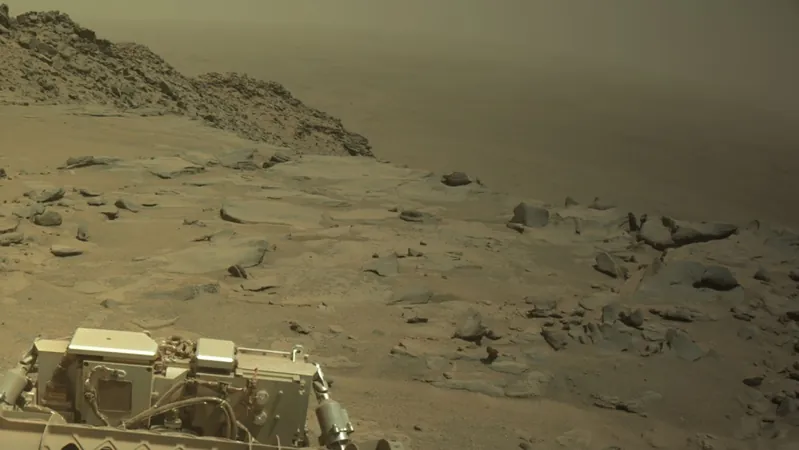
Elon Musk’s Mars Colony Dream: A Cautionary Reality Check from New Book
2024-11-22
Author: Benjamin
Introduction
As the climate crisis deepens and space technology reaches unprecedented heights, the shiny allure of starting anew on Mars captivates many minds, including the visionary Elon Musk. However, a new book argues that the monumental goal of settling the red planet, promised by Musk within the next 30 years, is grimly unrealistic and fraught with peril.
Overview of the Book
Penned by husband-and-wife duo Kelly and Zach Weinersmith, “A City on Mars: Can We Settle Space, Should We Settle Space, and Have We Really Thought This Through?” has just secured the prestigious 2024 Royal Society Trivedi Science Book Prize. Released in November 2023, the book delves deep into the harsh realities awaiting humanity on Mars, shattering the romanticized vision of interplanetary life.
The Authors' Perspective
Kelly, a biologist and adjunct assistant professor at Rice University, alongside Zach, a cartoonist, tackles essential questions about what life could look like if we were to become a multiplanetary species. They explore the significant challenges we would face, including how to establish sustainable agriculture in extraterrestrial conditions, potential complications of childbirth, and whether a new space race may ensue.
Skepticism and Realism
Despite initial optimism about mankind's future on Mars, the authors transitioned into skeptics through their research journey. In the book’s foreword, they poignantly note, “Leaving a 2°C warmer Earth for Mars would be like leaving a messy room to live in a toxic waste dump.”
Challenges of Life on Mars
The alarming reality is that many factors crucial to life on Mars remain uncertain. In discussing human reproduction on the planet, Kelly emphasized the stark lack of essential data derived from previous astronaut experiences in microgravity, underscoring just how little we know about human handling in Martian gravity, which is only 38% that of Earth.
Ethical Implications
Zach echoed this need for thorough understanding regarding reproduction and health, stressing that the unknowns of Martian life could lead to severe ethical implications if we rush into colonization without proper research. Given the physiological challenges, he argued that the assumption should be that human development on Mars could encounter alarming rates of abnormalities, without the medical infrastructure we take for granted back on Earth.
Mars' Hostile Environment
Mars, with its hostile environment characterized by thin atmosphere, extreme radiation, and potent regolith filled with jagged particles, poses formidable challenges for sustaining human life. The precarious nature of its seasons, including global dust storms that can last for weeks, further complicates the notion of a stable habitat. Additionally, the distance between Earth and Mars guarantees communication delays of up to 24 minutes, rendering urgent remote assistance nearly impossible.
A More Feasible Goal
In light of these challenges, Kelly identified a more feasible goal for our lifetime—a properly constructed research station on the Moon to conduct experiments. If successful, that could pave the way for eventual human exploration of Mars. However, the prospect of having families and children living on the Martian surface is further away than Musk’s overly ambitious timetable suggests.
Governance of Space
Moreover, the authors also touch upon the pressing issue of space governance, which remains shrouded in uncertainty. The 1967 Outer Space Treaty provides a rudimentary framework for outer space, notably forbidding claims of sovereignty over celestial bodies. Without clearer regulations, the potential for geopolitical tensions to escalate into a renewed space race between major powers looms closer than ever.
Hopeful Outlook
Despite the countless hurdles, Kelly and Zach remain hopeful for humanity's future in space but emphasize the crucial need for thorough research, ethical considerations, and cautious steps. Their book serves as both a wake-up call and a guide for those who dare to dream—and act—on the frontier of interplanetary living.
Conclusion
Will Humanity’s Mars Dreams Become a Nightmarish Reality? Only time, and thorough preparation, will tell.









 Brasil (PT)
Brasil (PT)
 Canada (EN)
Canada (EN)
 Chile (ES)
Chile (ES)
 España (ES)
España (ES)
 France (FR)
France (FR)
 Hong Kong (EN)
Hong Kong (EN)
 Italia (IT)
Italia (IT)
 日本 (JA)
日本 (JA)
 Magyarország (HU)
Magyarország (HU)
 Norge (NO)
Norge (NO)
 Polska (PL)
Polska (PL)
 Schweiz (DE)
Schweiz (DE)
 Singapore (EN)
Singapore (EN)
 Sverige (SV)
Sverige (SV)
 Suomi (FI)
Suomi (FI)
 Türkiye (TR)
Türkiye (TR)